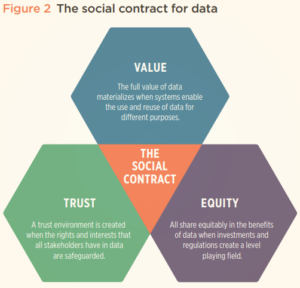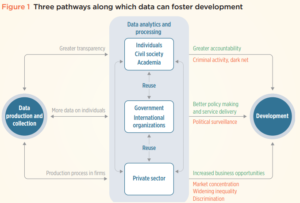In news: World Development Report, 2021: Data for Better Lives has been published by the World Bank recently
About World Development Report, 2021
- It focuses on how data can improve the lives of poor people and advance development objectives
- The report explores the tremendous potential of the changing data landscape to improve the lives of poor people, while also acknowledging its potential to open back doors that can harm individuals, businesses, and societies.
Key highlights: Main messages
The social contract for data: Report calls for a new social contract that enables the use and reuse of data to create economic and social value, ensures equitable access to that value, and fosters trust that data will not be misused in harmful ways.

Data as a force for public good: Public intent data—data collected with the intent of serving the public good by informing the design, execution, monitoring, and evaluation of public programs and policies—are a prerequisite for many government functions.

Infinite possibilities: Repurposing and integrating public- and private-intent data can help provide real-time and finer-scale insights, fill data gaps, and overcome limitations associated with each data type
Connecting the world: The digital character of modern data makes infrastructure a prerequisite for collecting, exchanging, storing, processing, and distributing data. Well-designed infrastructure policies are needed to redress these adverse trends.
Building trust: To create trust, countries need to protect data from misuse, while making it easier to share.
Leveling the playing field: An explosion of data platform businesses is a raising concern about competition
Crossing borders: Data are a tradable asset, but sending them across borders requires adequate data protection.
Governing data: Coordinated action between institutions allows data to flow safely between participants and promotes innovation.
Improving data systems: Fully harnessing the value of data requires building an Integrated National Data System
Key findings & suggestions of the report
The report flagged concerns over protection of personal data; misinformation; and attacks on software, networks and data systems.
Open data policy:
- The report finds that most countries have shied away from an open-data policy, more so countries with developing economies.
- It adds that only 11 per cent low-income countries consistently made available with a license classifiable as ’open
- The comparable rate for lower-middle-income countries was 19 per cent, for upper-middle-income countries 22 per cent and high-income countries 44 per cent.
Safeguarding public data:
- It says that public intent data should be safeguarded as a global public good and resource to achieve equitable and sustainable development
- Public intent data, a foundation of public policies, can bring value to development by:
- Improving service delivery
- Prioritising scarce resources
- Holding governments accountable and empowering individuals
- The exercise can also lead to a better emergency response during disasters — environmental, financial, health or conflict-related
- For instance, weather data, especially weather forecasts, can help people anticipate and prepare for extreme events
Underinvestment in public intent data systems
- The report flagged underinvestment in public intent data systems: Only half the countries had a national statistical plan that was fully funded as of 2019.
- It says that 93 percent of high-income countries had a fully funded national statistical plan, not a single low-income country had one.
- It says that lower-income countries were unable to harness the potential of data due to a lack of institutions, decision-making autonomy, and financial resources, all of which hold back their effective implementation and effectiveness of data systems and governance frameworks
Gaps in data on women and girls were particularly severe::
- It finds that only 10 of the 54 gender-specific indicators (19 per cent) in the United Nations-mandated sustainable development goals were widely available.
- Only 24 per cent of the available gender-specific indicators were from 2010 or later.
- It acknowledged that gender impacts of the pandemic have been incompletely measured due to gaps in sex-disaggregated data.
Data gaps in India
- Absence data on poverty from India: The report highlighted the concerns on assessment of global poverty by the World Bank, which has been skewed due to absence data on poverty from India.
Importance of updated granular data
- The report underlined importance of updated granular data, it called for strategic repurposing of existing data
- Using data collected for public or commercial purposes, by traditional or modern methods does not diminish their value to be reused for some other purpose. Data, that is, are inexhaustible.
- It gives the example of the Government of Tanzania which was able to profile the level of poverty across only 20 regions of the country’s mainland using only household survey data
- Real-time health data by using text messaging was able to cut the response time to outbreaks of disease by half.
- The technology was used after the 2012 Ebola outbreak to help implement quarantines and other protective measures by the Ugandan government.
- However, reusing or repurposing data requires well-functioning systems.
Way forward
The report says that data can advance development outcomes, so the challenges in data governance systems needs to addressed
The World bank also called for International cooperation to harmonise regulations and coordinate policies so that the value of data can be harnessed to benefit all, and to inform efforts toward a green, resilient and inclusive recovery.
In order to address the protection of personal data it calls for a new social contract around data
















